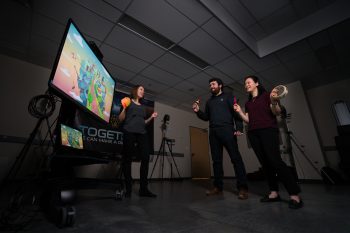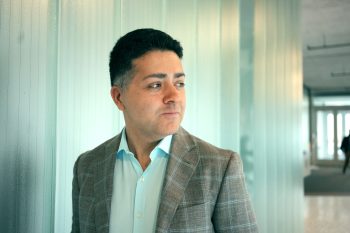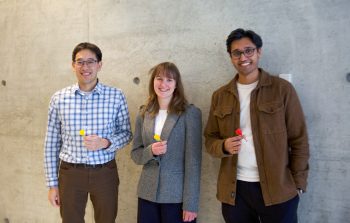The information available today, between books, the Internet and more, amounts to approximately 1,200 exabytes – that’s 1,200 billion gigabytes – of data. If all of that were stored on CDs, the discs would form five stacks, each tall enough to reach the moon.
Big data – sets of information that are too large to process using traditional computing methods – offers new opportunities for researchers, equipping them with new insights and processes to tackle new challenges.
To discover new applications for these massive data sets, nearly 200 researchers, graduate students and staff from a variety of fields joined forces last week for a one-day workshop called ‘Tools to Tackle Big Data’.
“As academics, we are often called upon to help develop solutions for many societal and environmental problems that the world faces today,” said Professor Farid Najm, ECE chair, “what some have called the ‘grand challenges’ in such areas as health, economic development, sustainability and the environment.
“These problems often require more than just ‘point solutions’ to specific technical problems, but a synthesis of a variety of solutions and approaches from across the many disciplines of engineering and science.”
Speakers from across the Faculty, as well as industry partners from IBM, highlighted many parallel initiatives employing big data and their inherent challenges. The datacentres we rely on to store and process this deluge of data, for example, are physically huge, inefficient and energy-expensive.
“I have been working on this for a long time,” said Professor Cristiana Amza (ECE), who pointed out the growing gap between the rate at which technology is improving and the ratewe’re collecting data. “The success stories have been scarce.”
ECE’s Professor Brendan Frey opened his talk by asking the audience to consider why each was there—what they wanted out of the day, and what they knew or wondered about big data. Responses ranged from “What is it?” to concerns over privacy and security.
“One of the big problems with big data is that, if you’re not careful, you’re going to generate a lot of stuff that nobody cares about,” said Professor Frey. His talk focused on the data science he and his group use to decipher parts crucial in regulating the three-billion letter-code human genome.
Graduate students presented posters over coffee and lunch breaks, while attendees networked. Professor Tony Chan Carusone, ECE’s associate chair of research, connected engineers and computer scientists with those who could benefit from employing data tools to solve problems in their fields.
Download presentations from each session at the Tools to Tackle Big Data workshop.



